Celebrating Our Graduates
Spring/Summer 2025
The School of Graduate and Postdoctoral Studies (SGPS) is proud of the accomplishments of our graduates and excited to showcase the diverse and impactful research they have undertaken and acknowledge their contributions to Ontario Tech's rich culture of innovation and excellence. To celebrate their achievements, we are pleased to present a selection of our recent graduates and details regarding their completed studies.
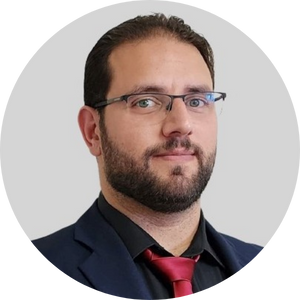
Ahmad Abu Nassar
Doctor of Electrical and Computer Engineering
Ahmad's thesis introduced a novel approach for the early detection, accurate classification, and proactive mitigation of cyberattacks targeting power systems. The proposed approach acheived remarkable performance, attaining detection and classification accuracies of 99.53% and 98.80%, respectively. In addition, the computational efficiency was substantially improved, leading to a 95.85% reduction in overall operational time. Beyond its performance metrics, the proposed methodogloy provided valuable interpretability by revealing attack patterns, thereby improving the transparency and reliability of decision-making processes. Furthermore, a proactive mitigation strategy was developed to minimize the operational impacts of cyberattacks on microgrid systems.
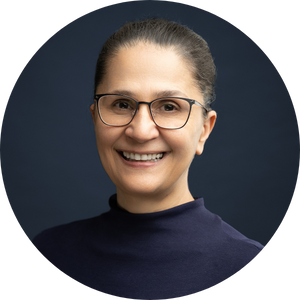
Aneta Stolba
Doctor of Education (EdD)
Aneta's research explores how autims is represented online and how advocacy organizations can foster more inclusive, effective, and credible communication. An analysis of 14 Canadian autism organizations showed continued reliance on medacalized models, complex language, and limited autistic leadership. To address these gaps, Aneta developed the CLEAR (Comprehensability, Logic, Evidence, Accessibility, and Representation) Framework as a guide for transparent, inclusive and evidence-based communication. Its principles are universally applicable, providing a practical model for strengthening digital advocacy, education, and policy by centering lived experience and translating inclusive values into measurable, meaningful action.
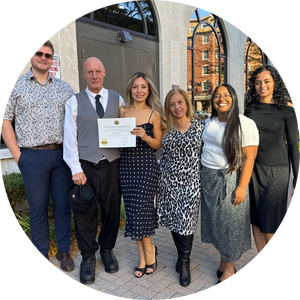
Corina Picco
Master of Science (MSc) Forensic Psychology
Corina's research investigated empathy deficits in individual with psychopathic traits and substance use disorders. Corina's thesis comprised two complimentary studies: a self-report investigation assessing cognitive and affective empathy, and a functional MRI study examining the neural correlates of empathy processes. This work aimed to disentangle the shared and unique contributions of psychopathy and substance use to empathy deficits, providing insight into the psychological and neurobiological mechanisms underlying antisocial and addictive behaviour. Corina's research contributes to advancing theory and improving intervention approaches with foresnsic and climinal populations

Daisee Lubrin
Master of Applied Bioscience
Title: Synthesis and Applications of Oligonucleotide-Bound Alginate Materials. Daisee's master's research focused on two applications of oligonucleotide-bound alginate hydrogels. The first was a biosensor to detect short oligonucleotides (DNA and RNA) in aqueous environments, and the second was using the alginate hydrogel to improve siRNA delivery and stability. This research showcased the versatility of alginate polymers and will be continued in Daisee's PhD research!

Doraianna Filippo
Master of Criminology
Extensive research highlights the importance of diversion programs, restorative justice, and community involvment in supporting youth in conflict with the law. Community volunteers play a key role by helping youth feel heard, valued, and accountable. This qualitative study used semi-structured interviews with 10 members of the Youth Justice Committee at the Boys and Girls Club of Durham. Most volunteers have youth or justice-related backgrounds and are motivated to help youth get back on track. They expressed a need for more training and feedback. Understanding volunteer experiences can strengthen programs, raise awareness, and enhance opportunties for youth needing support.
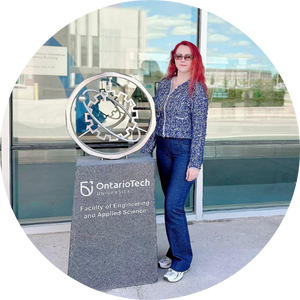
Hilal Sayhan Akci Turgut
Doctorate of Mechanical Engineering (PhD)
Hilal's thesis introduces and evaluates a novel integrated three-compartment electrolytic cation exchange membrane (E-CEM) reactor designed for the simultaneous extraction of carbon dioxide (CO2) from ocean water and generation of hydrogen (H2), with the ultimate goal of green methanol syntehsis. The E-CEM reactor operates through electrochemical acidification and cation exchange processes to convert oceanic bicarbonates and carbonates into gaseous CO2, while concurrently producing hydrogen via ocean water electrolysis.
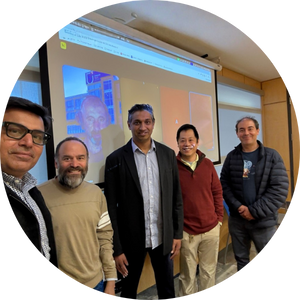
Kiran Mantripragada
Doctor of Philosophy (PhD) in Computer Science
Development of Deep Learning methods for hyperspectral image analysis, focusing on pixel unmixing and classification, addressing high dimensionality and limited labeled data, Kiran's research first explores robust Object-Based Image Analysis (OBIA) through spectral normalization and outlier removal. It then uses autoencoders for efficient spectral dimensionality reduction. The core contribution is the Latent Dirichlet Variational Autoencoder (LDVAE), a novel architecture for pixel unmixing by developing LDVAE, which inherently models abundance vectors, satisfying non-negativity and sum-to-one constraints, achieving state-of-the-art results. Together with iLDVAE and SpACNN-LDVAE, these advancements offer robust, efficient tools for applications in agriculture, environmental monitoring, and more.
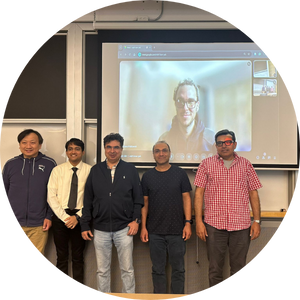
Madhav Goyani
Master of Science (MSc) in Computer Science
Title: Quasimetric Decision Transformers: Enhancing Goal-Conditioned Reinforcement Learning with Structured Distance Guidance. Madhav's research advances AI by improving how reinforcement learning agents make decisions in complex, goal-oriented environments. Traditional models struggle when rewards are sparse or delayed. To address this, Madhav developed the Quasimetric Decision Transformer (QuaD) - a model that replaces conventional reward signals with a learned measure of progress, or quasimetric distance. This structured guidance enables agents to reason more effectively about their goals. Tested on challenging navigation tasks, QuaD achieved stronger performance and stability, offering a new direction for building more intelligent and goal-aware autonomous systems.
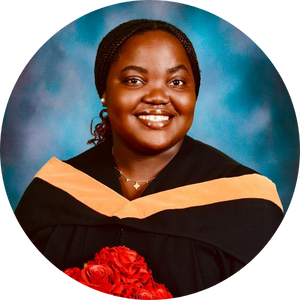
Mercy Nandutu
Master of Applied Science in Nuclear Engineering
Mercy's master’s thesis focused on determining the appropriate size of the Emergency Planning Zone (EPZ) for a generic Small Modular Reactor (SMR) using a dose consequence approach. Utilizing industry-standard simulation tools, Mercy generated the source term and conducted atmospheric dispersion modeling for a generic SMR and a large reactor assuming the worst case accident scenarios. The results demonstrated that, due to their inherent safety features and lower potential release magnitudes, SMRs can be supported by a significantly smaller EPZ compared to conventional large-scale reactors.
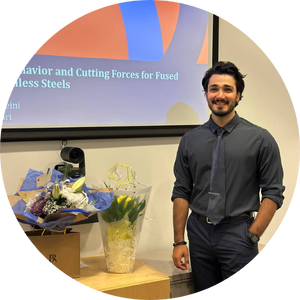
Mohammad Valiyan
MASc, Mechanical Engineering
Mohammad's thesis investigates the machinability of wrought and Metal Fused Filament Fabricated (MFFF) stainless steels 17-4PH and 316L, focusing on anisotropy from layer-by-layer printing. Quasi-static tensile and Split Hopkinson Pressure Bar (SHPB) tests were used to extract Johnson–Cook parameters, which were implemented in Oxley’s machining model and optimized with particle swarm optimization for cutting-force prediction. An inverse approach also identified parameters directly from machining data. Results show higher prediction errors for MFFF parts than wrought materials, indicating greater modeling complexity. This work delivers the first validated J–C parameters and a machining prediction framework for MFFF metals.
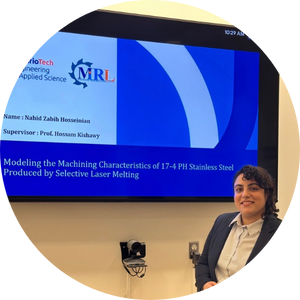
Nahid Zabih Hosseinian
Mechanical Engineering
Nahid's thesis investigates the machining behavior of Selective Laser Melted (SLM) 17-4 PH stainless steel in two build orientations (horizontal and vertical) compared to wrought material. Using Oxley’s shear-plane theory integrated with the Johnson–Cook constitutive model, Nahid modeled cutting forces under various conditions. A forward approach based on tensile and SHPB-derived parameters and an inverse approach using Particle Swarm Optimization (PSO) were applied to determine strain-rate sensitivity and thermal softening parameters. Experimental chip-formation tests validated the model, demonstrating the significant effect of build orientation on thermal-mechanical response and establishing an efficient method for extracting Johnson–Cook parameters.
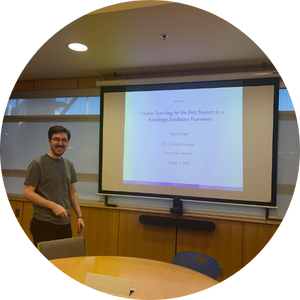
Steve Bakos
Computer Science
Finding an optimal "student" model's architecture and hyperparameters in Knowledge Distillation (KD) is a computationally intensive search. This thesis introduces the KD-Policy-Learning (KD-PL) framework to solve this. The framework uses a Reinforcement Learning (RL) agent that performs joint Neural Architecture Search (NAS) and Hyperparameter Optimization (HPO). It integrates an explicit caching mechanism and an adaptive proximity analysis module to systematically avoid redundant evaluations and estimate the performance of similar configurations. Experimental results demonstrate this framework significantly reduces computational cost, achieving 70-93% wall-clock time savings over baselines while maintaining competitive accuracy.
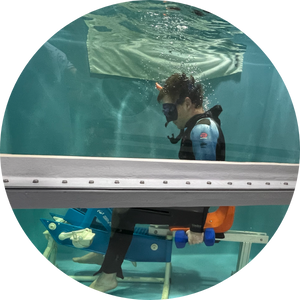
Tobias Cibis
Doctorate of Philosophy (PhD) in Computer Science
Title: Human survival in extreme environments depends on physiological and behavioural adjustments.
This research explored how humans adapt physiological to extreme environments such as underwater or space. Using computational modelling, the effects of underwater exposure immersion and ambient pressure on the human body were simulated. The models align closely with empirical data, enabling predictions of individual physiological responses. The model and obtained insights support the development of personalised exposure plans and have applications in translational medicine. By integrating environmental factors with human physiology, the research advances safety, performance, and health outcomes in challenging settings- from deep-sea exploration to space mission.
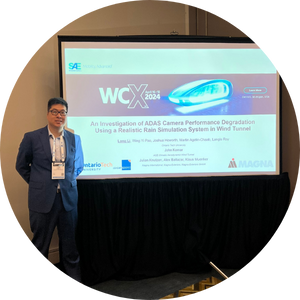
Tom Li
MASc, Mechanical Engineering
Motivated by the challenge of keeping Advanced Driver Assistance Systems reliable in rain, Tom's research developed new ways to evaluate camera sensor performance under realistic adverse-weather conditions. Tom designed the Vectorized Rain Simulation Apparatus (VeRSA), the most advanced indoor rain system in open literature, now adopted commercially. Using VeRSA, Tom benchmarked camera sensors, evaluated image-quality metrics, enhanced neural network training regimes with rain-degraded datasets, and built mathematical models linking rainfall to image degradation. As an R&D Engineer at the ACE Climatic Wind Tunnel, Tom continues advancing innovative testing capabilities for ADAS sensors while supporting a range of research initiatives.